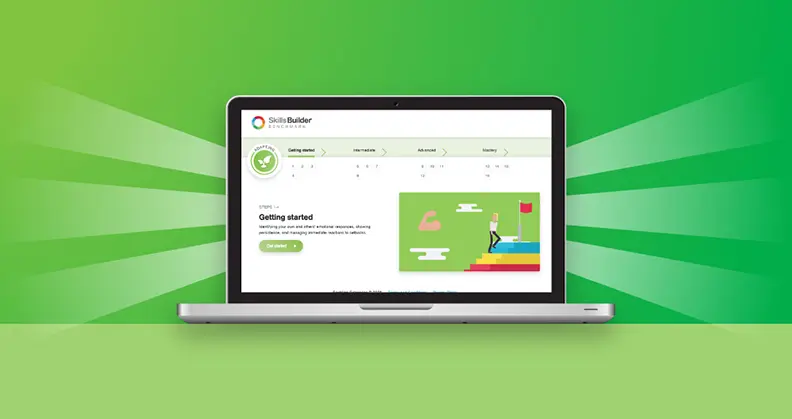Our take on new World Economic Forum white paper Schools of the Future: Defining New Models of Education for the Fourth Industrial Revolution – where we are featured as a leading innovator in the area of lifelong and student-driven learning
The bigger picture
We’re not short of predictions on the future of the job market. For years, reports from leading organisations around the world have warned of imminent changes in the structure of the working world. The future of work will offer unparalleled opportunities, to be sure; but there will also be significant challenges. The Future of Work report by the OECD (2019), for example, identifies globalisation, technological progress and demographic change as three factors that are already having a profound impact on society and labour markets.
The role of education
The new World Economic Forum whitepaper Schools of the Future describes how against a backdrop of ‘job disruption’ and 'increased socioeconomic polarisation’, primary and secondary schools will be pivotal in preparing children and young people to be engaged citizens and effective members of the workforce. In an ideal world, education models would adapt to equip children with the skills they need to succeed – and ultimately create a more ‘inclusive, cohesive and productive world’.
But while the working world has evolved at breakneck pace, education systems have often been slow to respond to these rapid changes, growing increasingly disconnected from the realities and needs of global economies and societies.
We need to design our curricula to prepare individuals for the technological advancements of the 21st century. They need to feature interactive methods that promote the critical and individual thinking needed in the innovation-driven economy of tomorrow: communication, creative problem solving, self-management and collaboration need to be taught explicitly alongside academic knowledge - embedded deeply into the curriculum.

Offering a solution
Alongside the development of new fields, almost all jobs are evolving to reflect the growing use of technology and automation of repetitive processes. This evolution is likely to place an increased premium on well-developed human-centric skills, and those with them will retain a distinct advantage over machines in the workplace.
The education systems, where children and young people spend most of their time, play a pivotal role: they define the values and norms that enable positive human interaction. In addition to technical skills, such as technology design and data analysis, it is crucial that schools also foster the broader ‘essential’ skills that will allow for an adaptable, competitive and productive workforce.
So how can we ensure this happens? A crucial step is making sure governments and employers support interpersonal skills development by aligning on and clearly defining the key competencies required for the future of work and the future of citizenship.
Similarly, leaders can collaborate to set new standards for what learning interpersonal skills could look like – as this is an area where there has so far been precious little consensus.
This is the work we do at the Skills Builder Partnership. Over the last decade, we have developed into a global partnership, including more than 750 organisations. Our approach enables educators, employers and other skills-building organisations to align on a common framework for building the eight essential skills for success. We help schools to integrate skills education into the core curriculum; connect businesses with local schools bring these skills to life; and work with a huge range of other organisations to integrate our approach into their own programmes. You can find out more about our journey, including our latest Impact Report and interviews with people building skills all across the Partnership, at skillsbuilder.org/tenyears.

To ensure alignment across participants and ensure that students have a lifelong mechanism for tracking their own skills development, we developed the Skills Builder Framework. The Framework is a shared language for building eight essential skills: Listening, Presenting, Problem Solving, Creativity, Staying Positive, Aiming High, Leadership and Teamwork. Each skill is clearly defined and broken down into specific, teachable steps, milestones and mastery indicators by age group. Each participant in the Partnership can use the Framework and the related assessments to measure student progress towards mastery of these eight skills.
Over the last decade, we’ve developed and refined our approach into the Skills Builder Principles. These Principles are the crucial complement to the Framework: they are the ‘how’ to the ‘what’. Each one echoes effective methods of building the core skills of literacy and numeracy.
For example, Principle 4 reminds us that skills education should build upon students’ previous learning, and focus on achieving mastery by giving the skills the time and focus they need. Saints John and Monica Primary School in Birmingham do this by making sure there is dedicated time in the school calendar for students to give their full attention to tasks that explicitly teach skills: like the multi-session classroom projects they run in the summer, which provide lots of opportunity for students to develop and apply skills, before running a celebratory final event attended by parents and carers.
The ultimate goal
We know there is an urgent need to update modern education systems so that children and young people can be equipped with the skills to navigate the future of work and society.
We formed the Skills Builder Partnership because we believe the only way to achieve this is through collective impact. We must work together, leveraging a shared language for teaching and measuring essential skills. Our mission is that one day, everyone will build the essential skills to succeed – whatever their path in life.
We’re proud of our successes over the last decade, but we know this is just the beginning. Creating system-level change will require closer collaboration between policy makers, educators and private sector leaders, who will need to connect and scale those efforts to create holistic education systems. We believe the Skills Builder approach offers a rigorous, proven foundation - we would invite everyone to get on board.






